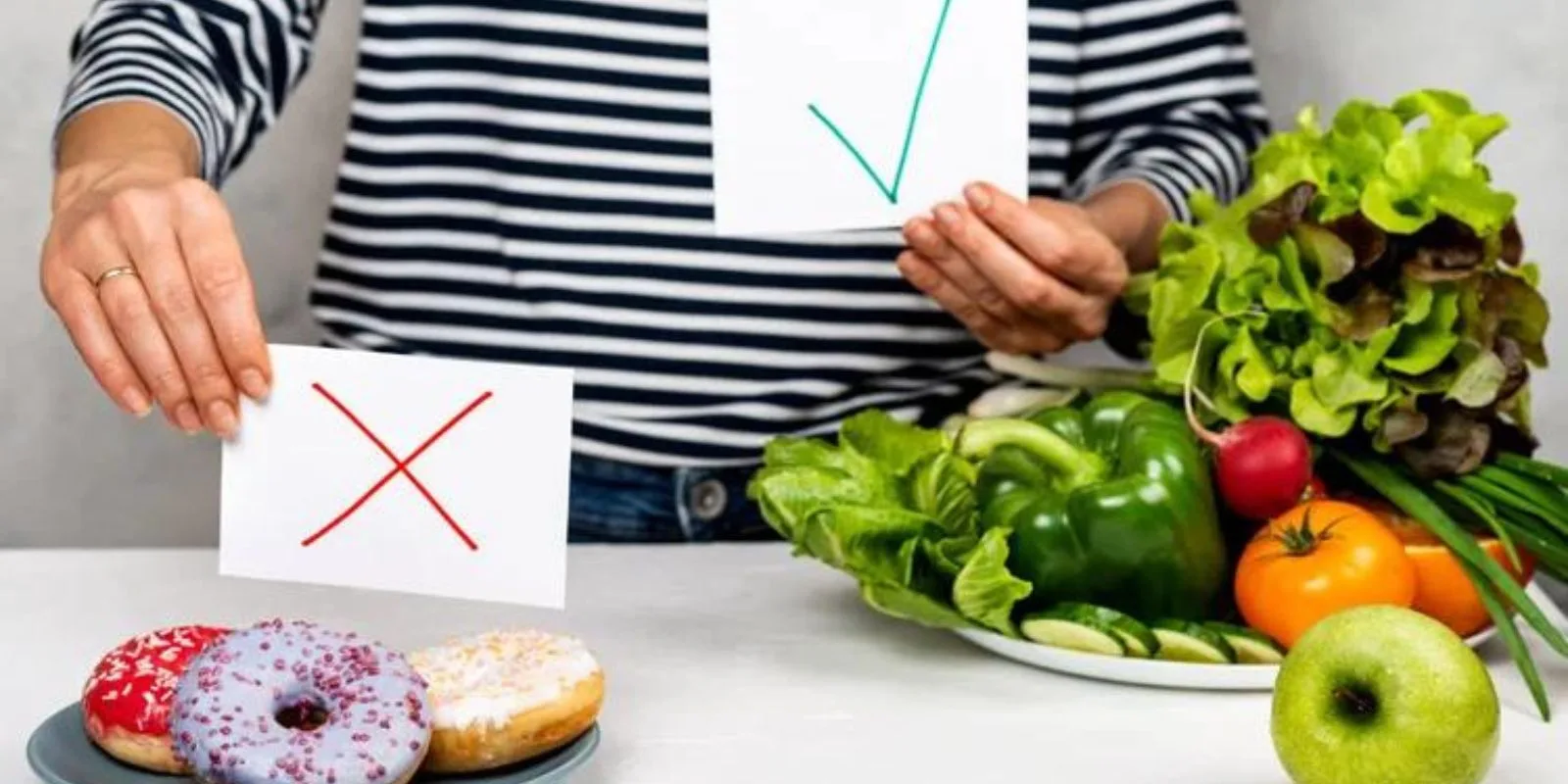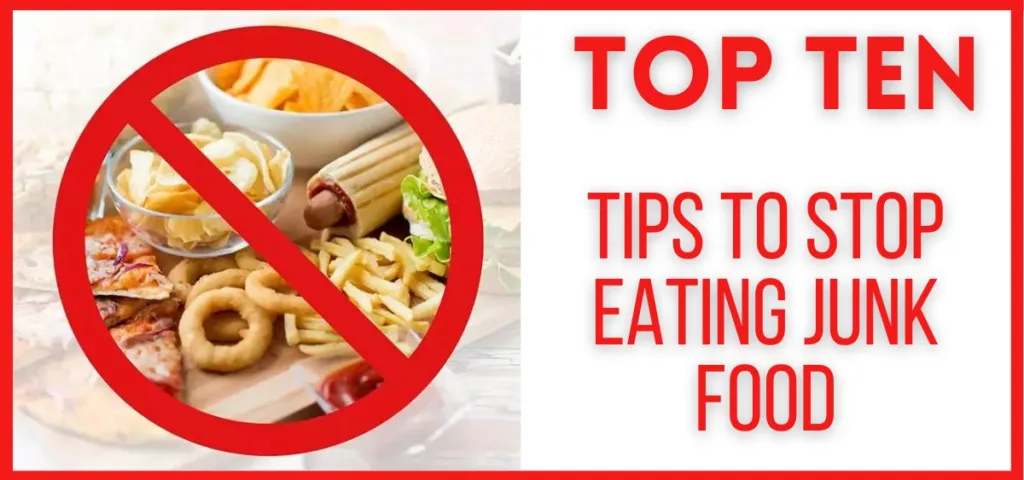Stop Eating Junk Food: “Junk food” is a term used to describe food that is high in calories from sugar and/or fat and possibly sodium, making it hyper-palatable, but with little dietary fiber, protein, vitamins, minerals, or other important forms of nutritional value. It is also known as HFSS food (high in fat, salt, and sugar). The term junk food is a pejorative dating back to the 1950s. Many different kinds of junk food can be easily found in most supermarkets and fast-food restaurants. Because of its easy access people are most likely to consume it.
Precise definitions vary by purpose and over time. Some high-protein foods, like meat prepared with saturated fat, may be considered junk food. Fast food and fast food restaurants are often equated with junk food, although fast food cannot be categorically described as junk food. Most junk foods are ultra-processed.
The Impact of Junk Food
Before we dive into the tips, it’s important to understand the impact of junk food on our health. These foods are typically high in calories, unhealthy fats, sugars, and additives while lacking essential nutrients. Regular consumption of junk food can lead to weight gain, an increased risk of chronic diseases, and a range of health issues.
The world is currently facing an obesity epidemic, which puts people at risk for chronic diseases like heart disease and diabetes. Junk food can contribute to obesity, yet it is becoming a part of our everyday lives because of our fast-paced lifestyles. Life can be jam-packed when you are juggling school, sports, and hanging out with friends and family! Junk food companies make food convenient, tasty, and affordable, so it has largely replaced preparing and eating healthy homemade meals.
Junk foods can be a treat to the taste buds, but their ill effects are widely known. Consuming them regularly can have adverse effects on your health and may cause irreparable damage to the body. Scientific research has shown that junk food, foods with added sugar, and processed foods can make you prone to type 2 diabetes and heart diseases. These foods can eventually make your brain weak and non-functional. Eating junk food affects both your physical and mental health. Let’s dive into some details about Stop Eating Junk Food and its harmful effects.
Kick the Cravings: Top Ten Tips to Stop Eating Junk Food
In today’s fast-paced world, resisting eating junk food can be a real challenge. The convenience and tastiness of these snacks often make it difficult to make healthier choices. However, with the right strategies, it’s possible to overcome those cravings and develop better eating habits. In this article, we’ll explore the top ten tips to help you break free from the grip of junk food and make choices that prioritize your health and well-being.

1. Identify Triggers
Understanding what triggers your junk food cravings is the first step in taking control of your diet. Often, these triggers are emotional or situational. You may reach for junk food when you’re stressed, bored, or feeling down. By identifying these triggers, you can find healthier ways to cope with your emotions. For example, you can try stress-relief techniques such as deep breathing, meditation, or exercise. These strategies divert your attention from junk food and provide a healthier outlet for stress or emotions.
2. Stock up on Healthy Alternatives
One of the best ways to curb your junk food cravings is by replacing unhealthy snacks with healthier alternatives. Keep your kitchen stocked with a variety of fruits, vegetables, and nuts. When you have nutritious options readily available, you’re more likely to make better choices when you’re hungry. These healthy alternatives not only satisfy your cravings but also provide essential vitamins, minerals, and fiber.
3. Plan Your Meals
Meal planning is a powerful tool in your journey to healthier eating. When you have well-balanced meals prepared in advance, you’re less likely to turn to junk food for a quick fix. Planning your meals allows you to ensure that you have a variety of nutrient-rich foods on your plate. You can include lean proteins, whole grains, and plenty of fruits and vegetables, all of which help keep your hunger and cravings in check.
4. Avoid Skipping Meals
Skipping meals can often lead to intense hunger, making it much harder to resist the temptation of junk food. When your blood sugar levels drop due to skipping a meal, you’re more likely to experience cravings for high-sugar, high-fat snacks. To prevent this, make sure you eat regular, balanced meals throughout the day. This keeps your blood sugar stable and ensures that you’re not ravenous when the next meal rolls around.
5. Stay Hydrated
Surprisingly, your body can sometimes confuse thirst with hunger. It’s a common scenario: you feel a pang of hunger, but what your body really needs is hydration. Drinking plenty of water throughout the day can help curb your cravings for junk food. Water not only keeps you properly hydrated but also creates a sense of fullness, making you less likely to reach for unhealthy snacks between meals.
6. Mindful Eating
Mindful eating involves savoring every bite and being fully present during your meals. When you eat mindfully, you pay close attention to the flavors, textures, and sensations of your food. You also listen to your body’s hunger and fullness cues, which can prevent overeating. Mindful eating can be a game-changer in your efforts to avoid junk food. It helps you develop a healthier relationship with food, fosters a greater appreciation for nutritious options, and keeps your consumption in check.
7. Read Food Labels
Understanding food labels is crucial when it comes to making informed food choices. Food manufacturers often use various tricks to make their products appear healthier than they are. To avoid junk food, look for items with low saturated fats, added sugars, and high levels of essential nutrients like fiber and vitamins. Reading food labels empowers you to make informed decisions about the foods you consume and avoid products with hidden, unhealthy additives.
8. Moderation is Key
It’s not necessary to eliminate junk food entirely from your diet. The key to balanced and sustainable eating is moderation. You can enjoy your favorite junk foods in moderation to satisfy your cravings without overindulging. Moderation means having that occasional treat while maintaining a focus on a diet that is predominantly based on nutritious, whole foods. By finding a healthy balance, you can enjoy your favorite treats without feeling deprived.
9. Seek Support
Breaking free from junk food cravings can be challenging, and it’s okay to seek support. Friends, family, or support groups can provide valuable assistance and encouragement. Sharing your goals and challenges with others can make a significant difference in your journey to healthier eating. Whether you need an accountability partner, someone to share healthy recipes with, or a group to discuss your progress, seeking support can help you stay motivated and committed to your goals.
10. Reward Yourself
Celebrating your successes in reducing junk food consumption is important. But instead of rewarding yourself with more food, consider non-food rewards. Treat yourself to something you’ve been wanting, such as a spa day, a new book, or a day out with friends. Non-food rewards reinforce the positive changes you’re making and help break the association between rewards and unhealthy snacks. This way, you can indulge in self-care and self-improvement, leaving junk food behind.
FAQs: Tips to Stop Eating Junk Food
Q: Is it okay to have junk food occasionally?
Yes, occasional indulgence is fine. Moderation is key.
Q: How can I resist the urge to eat junk food when stressed?
Try stress-relief techniques like deep breathing, meditation, or exercise to divert your attention from junk food.
Q: Can I make my favorite junk food healthier at home?
Yes, there are often healthier homemade versions of your favorite junk foods that you can enjoy guilt-free.
Q: What are some healthy snacks to replace junk food?
Opt for snacks like Greek yogurt, mixed berries, or air-popped popcorn for healthier options.
Q: How long does it take to break free from junk food cravings?
It varies from person to person, but with dedication, you can significantly reduce cravings in a few weeks.
Q: How can I deal with cravings for sugary junk food?
Try having a piece of fruit or a small piece of dark chocolate to satisfy your sweet tooth in a healthier way.
Conclusion: The Final Words
Stop Eating Junk Food is a journey that requires dedication and perseverance. While it may seem challenging at first, the benefits to your health and well-being are immense. By following the top ten tips outlined in this blog, you can effectively reduce your consumption of unhealthy foods and embrace a healthier lifestyle. Remember, stopping eating junk food is not about deprivation but about making informed choices and prioritizing your overall well-being. With consistency and commitment, you can achieve your goals and enjoy the positive impact on your health. So, take the first step today and stop eating junk food for a healthier, happier you.


































